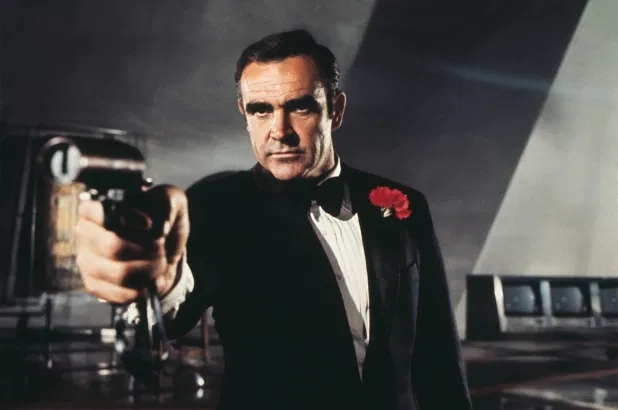
Diversions . . . by M.V. Moorhead
This is what a Scottish friend of mine reluctantly called to tell me, after seeing Craig, an Englishman, play the role of 007 in the 2012 movie Skyfall. The reason for his reluctance, of course, is that as a Scotsman, he felt disloyal to Sean Connery, the Scottish actor who became an international star playing the part in the first five films in the 007 series, and two more times after that.
My friend is perhaps a more objective person than I am, and I’m of Scottish descent myself, which may be why I couldn’t agree with him.
I’m easy where the Bond films are concerned: I’ve enjoyed every actor who has played the role, from the posh English Roger Moore— much to my friend’s horror—to Timothy Dalton to Pierce Brosnan, to the indeed excellent Daniel Craig. I didn’t even particularly mind the bland but affable George Lazenby in On Her Majesty’s Secret Service.
But Sean Connery, who departed on Oct. 31 at the age of 90, is still the best Bond.
The son of a factory worker and a cleaning lady, Connery was born in Edinburgh in 1930. He was a milkman when he was a young; my friend once observed that if everyone in Edinburgh who claimed that Connery delivered milk to them really did, then he must have had the largest milk route in the history of the dairy industry.
A big, strapping bodybuilder, Connery broke into acting after service in the Royal Navy, with bit and supporting parts onstage and in movies and TV.
He landed a lead in the charming, too-little-remembered 1959 Disney fantasy Darby O’Gill and the Little People before being chosen to play Ian Fleming’s creation James Bond in 1962’s Dr. No. It was Connery, for my money, who set the standard for the role, and who balanced the character’s aspects the most effortlessly: He was plausible as both the debonair, sophisticated gentleman and the ruthless killer.
And, of course, he had a nice, dryly witty way with a line and an amusingly above-it-all manner, which may have derived from his reported indifference to the role; he quickly became exasperated by his association with it.
Even so, he was never a cold fish; he always brought a subtle touch of warmth to Bond’s persona. Happily, he also eventually overcome his association with it, or at least proved that his range as an actor far surpassed secret agent antics.
Excellent as he was as Bond, Connery didn’t become a really interesting actor until he branched out from it. This started early with appearances in Hitchcock’s Marnie and later, in the ‘70s, with movies like Murder on the Orient Express and John Huston’s The Man Who Would Be King, opposite his friend Michael Caine (it’s said to be both his and Caine’s favorite of their own films).
Even the hilarious red loin-cloth-and-suspenders costume he wore in John Boorman’s bizarre 1973 sci-fi flick Zardoz didn’t defeat him.
But as he grew gray-bearded and majestically bald in the ‘80s and ‘90s, his career grew even richer.
He appeared in favorites like Time Bandits (as Agamemnon) and Highlander and The Hunt for Red October and The Rock, and in interesting, overlooked misfires like Cuba and Wrong is Right and Medicine Man and A Good Man in Africa, and he brought a degree of authority to all of them.
He even played the bookish Dad of the title character in 1989’s Indiana Jones and the Temple of Doom. And he won an Oscar as the brutal Chicago-Irish cop in Brian De Palma’s The Untouchables.
These are only some of the highlights of Connery’s post-Bond work. I think he’ll be remembered at least as much for this fine, mature phase of his career as for driving Aston Martins and deploying double entendre and teasing Q and flirting with Miss Moneypenny.
Even so, he is the best of the Bonds.

